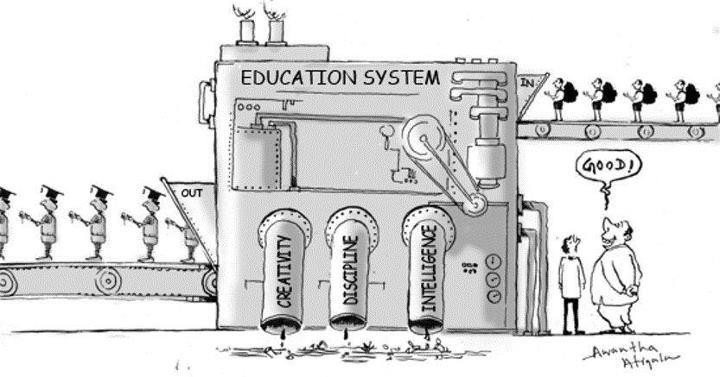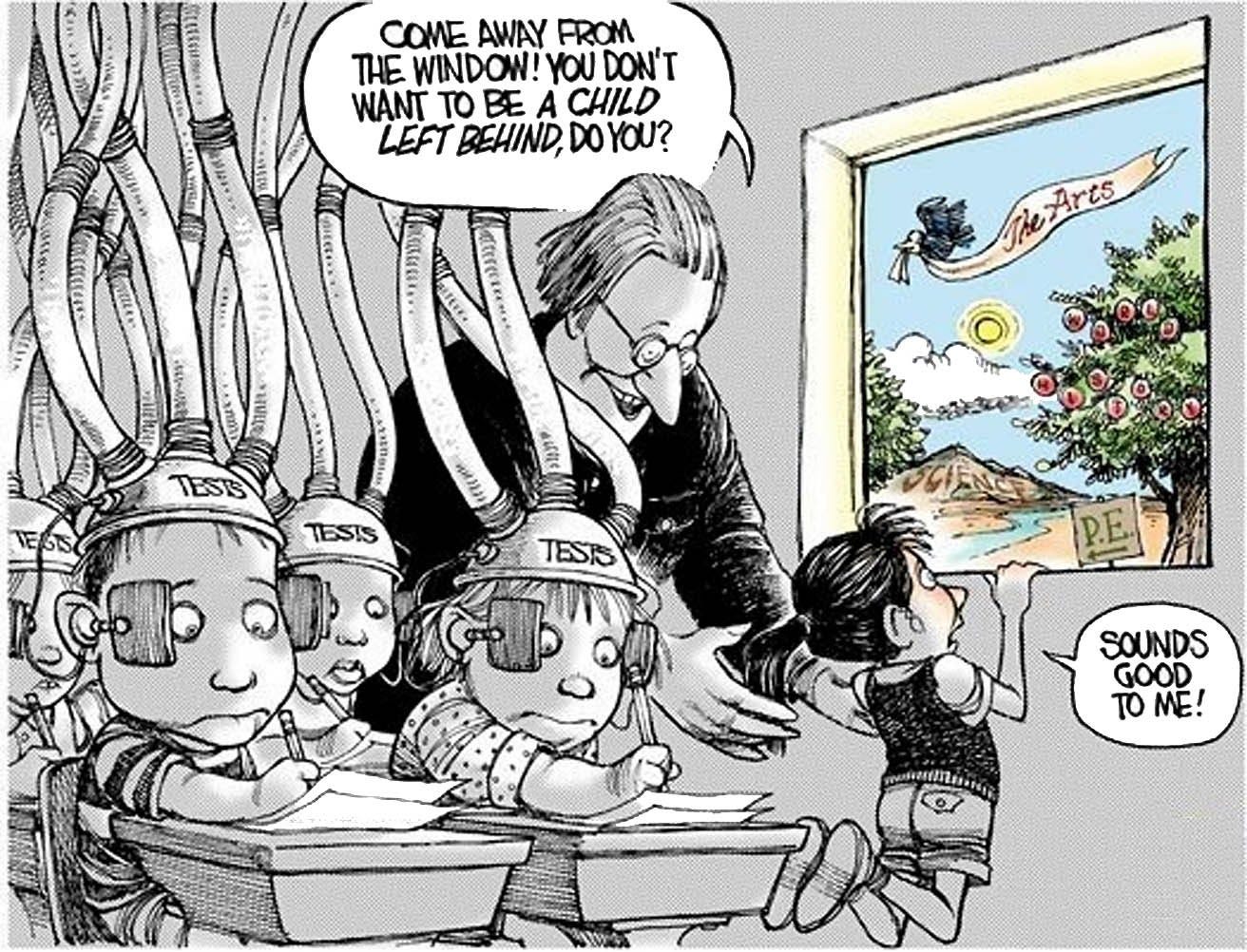Learning to earn vs. learning to learn - Literature Notes
See Sources/Learning to earn vs learning to learn - Essay #literaturenotes
# John Dewey
- prominent philosopher & educational thinker
- has covered art, politics, epistemology, and education
# Democracy in education
- believed in the ==role of democracy== and the importance of creating classrooms that reflect democratic values so that children would learn to ==function in the greater democratic society== they were expected to be a part of
- Thought that education should:
- prepare people for a life of curiosity and inquiry
- allow people to grow their knowledge using science and to become more aware of the societal problems
- enable people to take initiatives to execute upon problems
- pointed out that ==a democratic society is continually changing==—sometimes for the better, sometimes for the worse—and it requires citizens who are willing to participate and competent enough to distinguish between the better and the worse.
- ==higher education should uplift learners==, liberating their potentiality and empowering them to become ‘masters of their own industrial fate.’
# Experiential education
- The main basis of education is ==“reconstruction or reorganization of experience”==
- Cards/Constructionism
- one must learn from one’s experience in a fashion that ==avoids repeating mistakes== and that contributes to one’s ability to ==make more informed decisions== in the future.
- Parameters to be met:
- Continuity: the idea that ==experience comes from and leads to other experiences==, in essence propelling the person to learn more.
- Interaction
# The role of a teacher
An effective teacher…
- caters to ==different teaching methods== according to what the student resonates with.
- possess qualities that ==promote independence== in a democratic society
- ==knowledgeable== about the content area he or she should be an expert in.
- ==open-minded== to changes and model good ==citizenship==.
- possess the qualities of a ==good communicator== that can collaborate with other professionals to reach the highest of expectations that are possible for students.
- prepared to ==think globally== about how each student can compete with others for jobs in the future
- help to ==foster growth== and use experiential learning to ==reach personal goals==
# Snedden v.s. Dewey
# Learning-to-earn and Learning-to-learn
- Learning-to-earn
- Cards/Vocational education: a vocational approach in order to train workers to fuel the economy.
- does not build a habit to enable future self-directed-learning
- View of administrative progressive movement, which was spearheaded by David Snedden
- Learning-to-learn
- Cards/Liberal education
- Deeply personal
- students should learn a broad range of subjects to allow them to participate in greater democracy.

# Debate
- Snedden believes there is a need for two kinds of higher education:
- Cards/Liberal education for the elites
- Cards/Vocational education for the “rank and file”
- Dewey addressing vocational education:
- their vision of vocational education is too closely allied with the ==interests of industrialists== to serve the greater public interest
- it suggests an imprudent approach to educational reform, whereby no meaningful change is ever forthcoming. ==Vocationalism merely props up the status quo==, a disappointing state of industrial relations warranting the continued exploitation of workers by management.
# Who won?
- In terms of educational reform, Snedden
- Role of definition in a democracy:
- National Education Association Commission: The purpose of democracy is so to organize society that ==each member may develop his personality== primarily through ==activities designed for the well-being of his fellow members and of society== as a whole.
- Consequently: education in a democracy, both within and without the school, should develop in each individual the knowledge, interests, ideals, habits, and powers whereby ==he will find his place== and use that place to ==shape both himself and society toward ever nobler ends==
- Cards/Education lives within a system of domination and liberation
- How did Dewey lose?
- The administrative progressive message of educational utility and social efficiency had ==great appeal to policymakers and people in power== since it offered an answer to promote ==economic productivity== (vocational education taught students things they could use and apply to the workforce).
- The administrative progressives grounded their educational proposals on the ==authority of science.== They developed a way to measure ability and classify students and used these measures to develop curricula and organizational structures and schools. The literature presented in their proposal was filled with scientific terms which helped make the case of their vision as modern and data-driven.
- ==A utilitarian vision is easier to sell politically== than a romantic one proposed by Dewey, especially when it comes to expensive publicly-supported institutions like education. While Dewey talked about engaging the interest of the child to promote a richer understanding of the world to promote a more just and richer society, the administrative progressives talked about ==fixing social problems and expanding the economy.==
- Instead of Dewey’s vision, the administration ran with a ==social efficiency agenda== as an expression of democratic ideals.
- Changes that took place:
- the structure of curriculum tracking
- the tailoring of instruction to the academic skills of individual students
- the use of standardized testing for student placement
- the shift from purely academic studies to a more practical nature.
# Why Snedden’s view on education is problematic
- he viewed education as a way to prepare for a person’s calling in life.
- way of thinking is one that optimizes for social efficiency and is discriminatory: he believed that only the elites should obtain liberal education while the rest of the people should be trained in a vocation.
- Is Snedden’s vocationalism is the answer to ending poverty? Critics have argued that it does not.
- In this model of education (people are either consumers or producers), education is a tool to increase their potential earnings and escape poverty; the status quo is always upheld. ==When someone is educated, another uneducated person slots right into the role.==
- On the contrary, Dewey’s vision of democratic education serves more beyond increasing earning potential. He envisioned that with proper rich education experience, ==people will be better equipped to cure social ills== that need to be addressed including poverty and crime as well as health concerns.
# Vocationalism today
# Vocational schools and coding bootcamps
- Types:
- Vocational school
- Coding bootcamps with ISAs
- companies partnering up with Institutions to either sponsor education or work collaboratively to set a curriculum.
- As corporations become partners with education providers, a ==conflict-of-interest== emerges.
While a tuition-free education along with a part-time salary sounds like a sweet deal for students, Lutchen believes it’s the schools that stand to gain the most, financially speaking. He explains that a significant proportion of students require financial aid, with each one reducing the institution’s overall revenue. When a private company is paying the tab, however, the university is able to collect on the full cost.
“The mission of the institution is not to create employees for a specific company with a narrow set of skills that only that company can use; that would violate the mission of the undergraduate experience,” he says. “In fact, about 40% of engineers end up not working in engineering 10, 15 years after they graduate, so that would be a big concern.”
“The student is made to feel committed to the program rather than have an open mind, because the tuition dollars will stop if they want to switch majors,” he says. “That’s why we would not do that. We would say ‘pay us a certain amount to be on the steering committee, be a member of a consortium of companies.’ And then we know we’re preparing students for a variety of corporate pathways, not just one.”
# Microcredentials and universities
- Microcredentials: compressed online courses with a highly targeted curriculum to allow the learner to apply the knowledge directly to a workplace.
- interesting phenomenon: a partnership between universities with online providers such as EdX to provide these microcredentials.
- On the surface, the movement sounds like a great idea for students: unbundling university courses ==lowers the price==, and removing admission requirements also makes the courses ==more accessible.==
- However, a ==conflict of interest== between students and corporation might arise by engaging with microcredential production:
As microcredentialing purveyors, colleges and universities also make themselves increasingly subservient to their new clients: businesses and corporations in need of rapid, targeted vocational training for their employees. The traditional mission of enabling student growth through transformative teaching is traded for a corporate mission of ==maximizing efficiency and profitability at all costs.==
the boom in microcredentials is being fed in large part by major companies—IBM, Google, and Amazon, to name a few—looking to ==grow their talent pipeline== and ==increase the skill level of current employees==
- Microcredentials contribute to the ==decline of the traditional degree== by paving a way for people to substitute degree programs. For instance, Kazin and Clerkin ask, ‘why should an individual bother to pursue a full master’s degree if five courses alone are enough to confer career success?’.
# Conclusion
- Dewey believed…
- that a broad and diverse liberal education will lead to more well-rounded individuals who will then be better able to contribute to a democratic society in order to ==solve social ills.==
- that an education that is vocational (i.e. an education I can fully apply to the workplace) is an effective way to maintain the status quo and is ==ineffective for large scale changes==:
The kind of vocational education in which I am interested is not one which will ‘adapt’ workers to the existing industrial regime; I am not sufficiently in love with the regime for that. It seems to me that the business of all who would not be educational time-servers is to resist every move in this direction, and to strive for a kind of vocational education which will ==first alter the existing industrial system, and ultimately transform it==].

- When viewed through the lens of job creation and boosting the economy, vocational education does a good job at upholding that. However, in the lens of education and democracy, ==vocationalism strikes to undermine democracy.==
It is not sufficient, and it may actually undermine our democracy, to concentrate on producing people who do well on standardized tests and who define success as getting a well-paid job. ==Democracy means more than voting and maintaining economic productivity, and life means more than making money and beating others to material goods.==
- In his paper, Ralston described that ==microcredentials fall short of educating a whole person.== The point he brings up works equally well when we replace microcredentials with vocationalism.
Microcredentialing is unconcerned with educating the whole person. Unlike Liberal Arts education, which catalyzes changes in the entire character of the learner, vocationally oriented microcredentialing ==seeks only to transfer hard skills and technical competencies== to the client-learner. In the absence of a General Education component, microcredentialing tends to ==cultivate only a single dimension, aspect, or element of the learner’s character, effectively producing a technician, not a well-rounded person.== Past president of the University of Chicago, Robert Hutchins (1936/1958), voiced a similar complaint about vocational train- ing: ‘The pursuit of knowledge for its own sake is being rapidly obscured in universities and may soon be extinguished. [ . .] [S]oon everybody in a university will be there for the purpose of being trained for something. [ . .] It is plain, though, that it is bad for the universities to vocationalize them’ (36–7). Insofar as microcredentialing fails to educate the whole person, it exacerbates one symptom of the neoliberal learning economy, namely, the turn away from pursuing knowledge for its own sake and towards learning to earn (Siskin and Warner 2019).
- By providing vocational training exclusively, higher education institutions cut their students off from more elevated pursuits (e.g. art, history, cultural studies) and ==condemn them to a life of subservience to their industrial and corporate masters.==